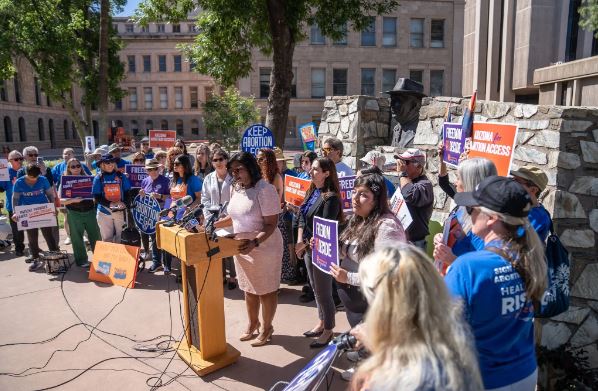Emotions ran high outside the Arizona State Capitol as residents grappled with the fallout of a recent decision by the state’s highest court upholding an 1864 law that severely restricts abortions. Pam Raphael, arriving to deliver frozen treats, found herself consumed with anger over the ruling, joining a chorus of voices denouncing the decision at a nearby rally.
The court’s decision, which effectively bans nearly all abortions except in cases where the mother’s life is at risk, elicited a range of reactions from Arizonans, reflecting deep divisions across the political spectrum. While some conservative voters hailed the decision as a victory for women, many Democrats, moderate independents, and even some Republicans expressed dismay, viewing it as an imposition of outdated moral values on a modern, progressive state.
Critics of the ruling argued that the court’s decision ignored the complexities of reproductive rights and forced a 19th-century morality onto a state striving for inclusivity and tolerance. Maverick Williams, echoing the sentiments of many, emphasized the importance of allowing women to make their own choices about their bodies.
Despite the decision’s immediate impact, its implications for the upcoming presidential election remained uncertain. While Democrats seized the opportunity to blame former President Donald J. Trump for appointing justices who played a role in overturning Roe v. Wade, some voters expressed concerns beyond abortion, citing issues like the cost of living and the performance of President Biden.
Amidst the political discourse, voices like Nicki Auchter and her husband, Scott, reflected a nuanced perspective, acknowledging personal opposition to abortion while advocating for a woman’s right to choose. Their concerns, however, extended beyond abortion to encompass broader issues such as the national debt and immigration.
While some Republican politicians distanced themselves from the ruling, others, like Cathi Herrod of the Center for Arizona Policy Action, praised it as a defense of “the humanity of the unborn child.” However, many women, like Crystal Padilla, voiced dismay over what they saw as a disregard for women’s autonomy and the challenges faced by low-income mothers.
Padilla, drawing from her own experience of having an abortion as a teenager, emphasized the importance of preserving choice and empathizing with individuals facing difficult decisions. Her sentiments were echoed by McCall Lemmons, who, despite disappointment with President Biden on other issues, emphasized the significance of abortion rights in shaping her voting decision.
Overall, the ruling ignited passionate debate and highlighted the deep-seated divisions within Arizona’s political landscape. As residents grappled with the fallout, it became evident that the issue of abortion would continue to be a defining factor in the state’s political discourse and upcoming elections.

